






| 9:00 am - 9:10 am | Introduction (Richard Voyles). |
| 9:10 am - 9:40 am | Robin Murphy, Texas A&M. Title: Robotics in Response to Emergency Events |
| 9:40 am - 10:10 am | Jiahong Dong, MD, Dean of School of Clinical Medicine, Tsinghua University. Title: No-Touch Care- from the Aspect of Front-Line Medical Staffs |
| 10:10 am - 10:30 am | Gangtie Zheng, Tsinghua University. Title: Robotic Deployments for No-Touch Patient In-Take |
| 10:30 am - 10:50 am | Kesh Kesavadas, Director of the Health Care Engineering Systems Center, University of Illinois at Urbana-Champaign. Title: UVBot - a Low Cost Autonomous Robot for Indoor Sanitizing |
| 10:50 am - 11:00 am | Break |
| 11:00am - 12:15 pm | Public/Private Panel Discussion: European Commission, US NSF, US NIH, Israel, Venture Capitalists.
Cecile Huet, Deputy Head, Robotics and AI, European Commission |
| 12:15 pm - 12:35 pm | Qing Gao, Kerui Yi, Qiwen Wang, Yongquan Chen & Zheng Li The Chinese University of Hong Kong, Shenzhen. Title: Oropharynx Visual Detection for OP-swab Robot Sampling based on Deep Learning |
| 12:35 pm - 1:15 pm | Lunch Break |
| 1:15 pm - 1:40 pm | Brad Nelson, ETH Zurich. Title: Combating COVID-19: The Role of Robotics in Managing Public Health and Infectious Diseases |
| 1:40 pm - 2:00 pm | Tomonari Furukawa, University of Virginia. Title: Robotic Surface Disinfection and Mapping of Disinfected Surfaces |
| 2:00 pm - 2:20 pm | Haoguang Yang, Purdue University. Title:Modular Robots in Response to Evolving Human Safety Demands during the COVID-19 Pandemic |
| 2:20 pm - 2:40 pm | Mohammad Mahoor, University of Denver. Title: Socially Assistive Robotics for Elderly People with Depression and Dementia |
| 2:40 pm - 3:00 pm | Krishna Chaitanya Kodur, Kaustubh Rajpathak, Akilesh Rajavenkatanarayanan, Maria Kyrarini, Fillia Makedon University of Santa Clara, University of Texas at Arlington Title: Towards a Multi-purpose Robotic Nursing Assistant |
| 3:00 pm - 3:30 pm | Kris Hauser, University of Illinois at Urbana-Champaign Title: Toward No-Touch Robotic Nursing and Routine Medical Care |
| 3:30 pm - 4:10 pm | Break-Out Sessions & Report.
|
| 4:10 pm - 4:30 pm | Juan Wachs, Purdue University. Title: Immersive Robotics and the Curse of Sterility |
| 4:30 pm - 4:40 pm | Summary and Wrap-Up |
 Dr. Richard M. Voyles is the head of the Collaborative Robotics Lab at Purdue and Director of the Robotics Accelerator. With expertise in electrical engineering, mechanical engineering and computer science, Dr. Voyles' research interest include novel robotic mechanisms, sensors, self-adaptive software, real-time control, and gesture-based human/robot interaction. His professional experience includes IBM, Avanti Optics, Integrated Systems and Dart Controls, tenured academic positions at the University of Minnesota, University of Denver, and Purdue University, positions with the federal government including leading the National Robotics Initiative at the National Science Foundation and Assistant Director for Robotics and Cyber-Physical Systems at the Office of Science and Technology Policy at the White House, and Board of Director positions on The Works, Easton Family Foundation, Minnesota Virtual Simulations and Mark V Automation. At Purdue, Dr. Voyles studies infrastructure tools for self-adaptation in real-time and embedded systems. He also directs research in miniature robotics for search and rescue, including small crawling ground robots for penetration into rubble, hybrid serpentine robots for moving over rubble, and high-precision UAVs for inspecting rubble and structures from the air.
Dr. Richard M. Voyles is the head of the Collaborative Robotics Lab at Purdue and Director of the Robotics Accelerator. With expertise in electrical engineering, mechanical engineering and computer science, Dr. Voyles' research interest include novel robotic mechanisms, sensors, self-adaptive software, real-time control, and gesture-based human/robot interaction. His professional experience includes IBM, Avanti Optics, Integrated Systems and Dart Controls, tenured academic positions at the University of Minnesota, University of Denver, and Purdue University, positions with the federal government including leading the National Robotics Initiative at the National Science Foundation and Assistant Director for Robotics and Cyber-Physical Systems at the Office of Science and Technology Policy at the White House, and Board of Director positions on The Works, Easton Family Foundation, Minnesota Virtual Simulations and Mark V Automation. At Purdue, Dr. Voyles studies infrastructure tools for self-adaptation in real-time and embedded systems. He also directs research in miniature robotics for search and rescue, including small crawling ground robots for penetration into rubble, hybrid serpentine robots for moving over rubble, and high-precision UAVs for inspecting rubble and structures from the air.
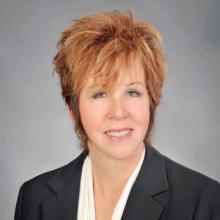 Dr. Robin R. Murphy is the Raytheon Professor of Computer Science and Engineering at Texas A&M University, a director of the Center for Robot-Assisted Search and Rescue, and an ACM and IEEE Fellow. She specializes in human-robot interaction and human-centered AI for ground, air, and marine robots. She is a TED speaker and the author of over 150 papers and four books including the award-winning Disaster Robotics. She has deployed robots to over 29 disasters in five countries including the 9/11 World Trade Center, Fukushima, and Hurricane Harvey. She blogs about learning about AI and robotics from fun science fiction at RoboticsThroughScienceFiction.com.
Dr. Robin R. Murphy is the Raytheon Professor of Computer Science and Engineering at Texas A&M University, a director of the Center for Robot-Assisted Search and Rescue, and an ACM and IEEE Fellow. She specializes in human-robot interaction and human-centered AI for ground, air, and marine robots. She is a TED speaker and the author of over 150 papers and four books including the award-winning Disaster Robotics. She has deployed robots to over 29 disasters in five countries including the 9/11 World Trade Center, Fukushima, and Hurricane Harvey. She blogs about learning about AI and robotics from fun science fiction at RoboticsThroughScienceFiction.com.
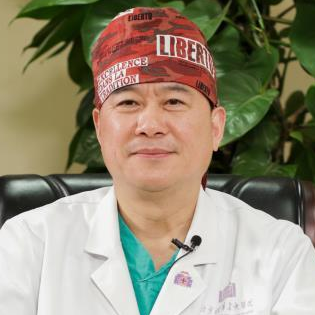 Dr. Jiahong Dong is Professor, Dean of the School of Clinical Medicine, President of Beijing Tsinghua Changgung Hospital, Tsinghua University. He is a member of Chinese Academy of Engineering, as well as the President of Chinese Medical Doctor Association (CMDA).
Dr. Jiahong Dong is Professor, Dean of the School of Clinical Medicine, President of Beijing Tsinghua Changgung Hospital, Tsinghua University. He is a member of Chinese Academy of Engineering, as well as the President of Chinese Medical Doctor Association (CMDA).
Dr. Dong has made remarkable achievements in hepatobiliary surgery, especially in the management of complex biliary diseases. Dr. Dong innovatively applied the precision surgery to intrahepatic bile duct diseases. For his outstanding contribution in hepatobiliary surgery, Dong was awarded the 2nd class prize of the National Award of Science and Technology Progress as the first contributor and the 1st class prize of the National Award of Science and Technology Progress as co-director. Dr. Jiahong Dong's respected and active roles in the academic community include the standing committee member of the Chinese Medical Association (CMA) Surgery Branch and the Chinese Society of Organ Transplantation, Chief of the CMA Biliary Surgery Branch, Chairman of the Liver Tumor Branch of China International Exchange and Promotive Association for Medical and Health care (CPAM).
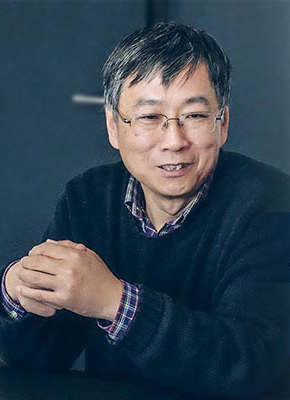 Dr. Gangtie Zheng is an engineering professor at Tsinghua University, Beijing, as well as the co-director of Digital Medicine and Medical Robot Center at Tsinghua. He has conducted researches on medical robots for orthopedic and vascular surgery. In February 2020, his team quickly put together a robot that performs common procedures for potentially infected patients while keeping medical workers safe. This robot has been deployed and tested in hospitals in China, as was first reported by Reuters. A follow-up video (youtu.be/6sWmfuFIXTg ) will illustrate the path of development of the project.
Dr. Gangtie Zheng is an engineering professor at Tsinghua University, Beijing, as well as the co-director of Digital Medicine and Medical Robot Center at Tsinghua. He has conducted researches on medical robots for orthopedic and vascular surgery. In February 2020, his team quickly put together a robot that performs common procedures for potentially infected patients while keeping medical workers safe. This robot has been deployed and tested in hospitals in China, as was first reported by Reuters. A follow-up video (youtu.be/6sWmfuFIXTg ) will illustrate the path of development of the project.
 Dr. Thenkurussi "Kesh" Kesavadas is the founder Director of the Health Care Engineering Systems Center at the University of Illinois at Urbana-Champaign and the Co-founder of AirV Labs. He is a professor of Industrial and Enterprise Systems Engineering, and holds faculty appointments in the Department of Computer Science, the Department of Electrical and Computer Engineering and with the Carle-Illinois College of Medicine at the university. His current research focuses on medical robotics and virtual reality for medicine. He is a serial entrepreneur and has started two successful companies in the area of VR and training. Kesavadas developed the world's first stand-alone virtual reality Robotic Surgical Simulator called RoSS that is used around the world to train residents and medical students. This invention led to forming Simulated Surgical Systems to commercialize RoSS. In 2019, Kesavadas co-founded AirV Labs, a company with focus on rapid prototyping of VR content which combines knowledge with AI. Kesh Kesavadas has also won numerous awards including SUNY Chancellor's Award for Innovation, Inventor of the Year award in Western New York and the University of Buffalo's Visionary of the Year award. He was also named as one of the five gurus of biomedical engineering by Business Week Magazine for his work on VR based medicine.
Dr. Thenkurussi "Kesh" Kesavadas is the founder Director of the Health Care Engineering Systems Center at the University of Illinois at Urbana-Champaign and the Co-founder of AirV Labs. He is a professor of Industrial and Enterprise Systems Engineering, and holds faculty appointments in the Department of Computer Science, the Department of Electrical and Computer Engineering and with the Carle-Illinois College of Medicine at the university. His current research focuses on medical robotics and virtual reality for medicine. He is a serial entrepreneur and has started two successful companies in the area of VR and training. Kesavadas developed the world's first stand-alone virtual reality Robotic Surgical Simulator called RoSS that is used around the world to train residents and medical students. This invention led to forming Simulated Surgical Systems to commercialize RoSS. In 2019, Kesavadas co-founded AirV Labs, a company with focus on rapid prototyping of VR content which combines knowledge with AI. Kesh Kesavadas has also won numerous awards including SUNY Chancellor's Award for Innovation, Inventor of the Year award in Western New York and the University of Buffalo's Visionary of the Year award. He was also named as one of the five gurus of biomedical engineering by Business Week Magazine for his work on VR based medicine.
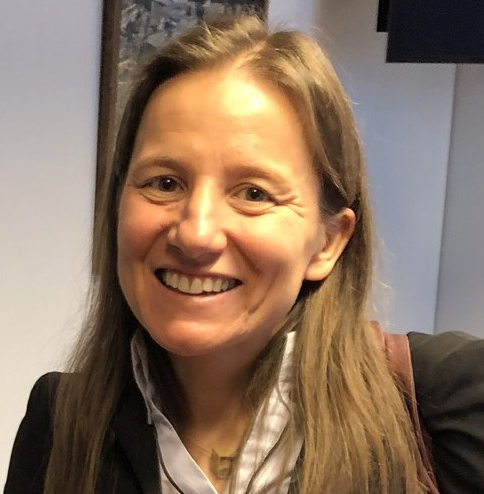 Dr. Cecile Huet is Deputy Head of the Unit "Robotics and Artificial Intelligence Innovation and Excellence" at the European Commission. This unit funds and assists beneficial robotics and AI developments within Europe.
Dr. Cecile Huet is Deputy Head of the Unit "Robotics and Artificial Intelligence Innovation and Excellence" at the European Commission. This unit funds and assists beneficial robotics and AI developments within Europe.
Under Horizon 2020, the unit launched one of the world's largest civilian programme in robotics with a budget of €700 million, supplemented by €2.1 billion from the European robotics industry in the context of the Robotics Public-Private Partnership. This unit is also at the heart of the Communication on Artificial Intelligence for Europe, the Coordinated Plan on Artificial Intelligence, the Communication on Building Trust in Human-Centric Artificial Intelligence, and the 'ecosystem of excellence' of the White Paper on AI. Cecile joined the unit since its creation in 2004. Previously, she worked for the industry in signal processing after a post-doc at the University of California Santa Barbara and a PhD at University of Nice Sophia Antipolis.
In 2015, she has been selected as one of the "25 women in robotics you need to know about".
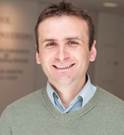 Dr. Erion Plaku is a Program Director at the National Science Foundation in the Directorate for Computer and Information Science and Engineering (CISE), Division of Information and Intelligent Systems (IIS). Dr. Plaku manages programs in Robust Intelligence, Foundational Research in Robotics, National Robotics Initiative, and National Artificial Intelligence Research Institutes. Dr. Plaku is serving a rotation at NSF from George Mason University, where he is an Associate Professor in the Department of Computer Science. His research is on Robotics and AI, focusing on enhancing robot autonomy and human-robot collaborations. Dr. Plaku received his Ph.D. degree in Computer Science from Rice University in 2008 and was a Postdoctoral Fellow at Johns Hopkins University. More information, including publications and research projects, can be found at http://robotmotionplanning.org
Dr. Erion Plaku is a Program Director at the National Science Foundation in the Directorate for Computer and Information Science and Engineering (CISE), Division of Information and Intelligent Systems (IIS). Dr. Plaku manages programs in Robust Intelligence, Foundational Research in Robotics, National Robotics Initiative, and National Artificial Intelligence Research Institutes. Dr. Plaku is serving a rotation at NSF from George Mason University, where he is an Associate Professor in the Department of Computer Science. His research is on Robotics and AI, focusing on enhancing robot autonomy and human-robot collaborations. Dr. Plaku received his Ph.D. degree in Computer Science from Rice University in 2008 and was a Postdoctoral Fellow at Johns Hopkins University. More information, including publications and research projects, can be found at http://robotmotionplanning.org
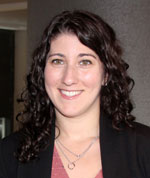 Dr. Moria Fisher Bittmann will present on current funding opportunities at the National Institute of Biomedical Imaging and Bioengineering (NIBIB) and across the National Institutes of Health (NIH). The mission of NIBIB is to improve health by leading the development and accelerating the application of biomedical technologies. The Institute is committed to integrating engineering and physical sciences with biology and medicine to advance our understanding of disease and its prevention, detection, diagnosis, and treatment. NIBIB supports emerging technology research and development within its internal laboratories and through grants, collaborations, and training.
Dr. Moria Fisher Bittmann will present on current funding opportunities at the National Institute of Biomedical Imaging and Bioengineering (NIBIB) and across the National Institutes of Health (NIH). The mission of NIBIB is to improve health by leading the development and accelerating the application of biomedical technologies. The Institute is committed to integrating engineering and physical sciences with biology and medicine to advance our understanding of disease and its prevention, detection, diagnosis, and treatment. NIBIB supports emerging technology research and development within its internal laboratories and through grants, collaborations, and training.
Dr. Bittmann conducted her graduate work at the Rehabilitation Institute of Chicago where she developed customized robotic therapies for post-stroke rehabilitation. She completed a postdoctoral fellowship at the University of Wisconsin in computational biomechanics. Prior to joining NIBIB, she was a Health Program Specialist at the National Institute of Neurological Disorders and Stroke (NINDS) supporting BRAIN Initiative funding opportunities for invasive technologies, computational neuroscience, and technology dissemination. Throughout her career, she has enjoyed working on interdisciplinary topics, collaborating on projects with engineers, clinicians, computer scientists and biologists.
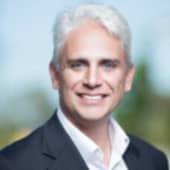 Dr. Errol Arkilic is a Founder of M34 Capital. M34 is an investment company that focuses on seed and early-stage projects being spun out of academic and corporate research labs. Typical investments range from $750,000 to $1,000,000 and usually represent the first outside capital deployed. M34 focuses on turning science projects into companies and does so across a broad spectrum of technologies and geographies. He is also a founder of USRCA.org, a non-profit with a focus on entrepreneur education for science and engineering graduates.
Dr. Errol Arkilic is a Founder of M34 Capital. M34 is an investment company that focuses on seed and early-stage projects being spun out of academic and corporate research labs. Typical investments range from $750,000 to $1,000,000 and usually represent the first outside capital deployed. M34 focuses on turning science projects into companies and does so across a broad spectrum of technologies and geographies. He is also a founder of USRCA.org, a non-profit with a focus on entrepreneur education for science and engineering graduates.
Previously, Errol was the founding and lead program director for the National Science Foundation Innovation Corps program. He led the I-Corps effort from its inception until July 2013. Prior to this, he was the lead software and services Program Director for the NSF SBIR program. Before his government service, Errol was founder and CEO at StrataGent Lifesciences (Acquired by Corium International: CORI) and Manager of Product Engineering at Redwood Microsystems. He received his BS in Mechanical Engineering from The George Washington University and his Masters and Ph.D. degrees in Aero/Astro Engineering from MIT.
 Dr. Yongquan Chen , Member of IEEE, serves as researcher in Institute of Robotics and Intelligent Manufacturing, The Chinese University of Hong Kong, Shenzhen, and Director of Research Center on Unmanned Systems (RCUS) of Shenzhen Institute of Artificial Intelligence and Robotics for Society.
Dr. Yongquan Chen , Member of IEEE, serves as researcher in Institute of Robotics and Intelligent Manufacturing, The Chinese University of Hong Kong, Shenzhen, and Director of Research Center on Unmanned Systems (RCUS) of Shenzhen Institute of Artificial Intelligence and Robotics for Society.
Dr. Chen received his B.S. (2005) and M.S. (2007) Degree in Electronics and Information Engineering from Huazhong University of Science and Technology. Thereafter, he joined The Shenzhen Institutes of Advanced Technology (SIAT) of the Chinese Academy of Science (CAS) and The Department of Mechanical and Automation Engineering (MAE) at The Chinese University of Hong Kong as Research Assistant (2007-2010). He received his Ph.D. (2014) in Mechanical and Automation Engineering from The Chinese University of Hong Kong. He worked in the Department of Mechanical and Automation Engineering at the same university as a Research Associate (2015-2016) after graduation.
Dr. Chen's research group is devoted to developing robots and intelligent systems that are able to autonomously operate in urban complex and diverse environments. The research focus includes novel methods for perception, mapping, path planning, manipulation and cooperation between multiple agents.
 Dr. Bradley Nelson has been the Professor of Robotics and Intelligent Systems at ETH Zurich since 2002, where his research focuses on microrobotics and nanorobotics. Fundamentally, he is interested in how to make tiny intelligent machines that are millimeters to nanometers in size. He has been at Honeywell and Motorola and served as a United States Peace Corps Volunteer in Botswana, Africa, before obtaining a Ph.D. in Robotics from Carnegie Mellon University in 1995.
Dr. Bradley Nelson has been the Professor of Robotics and Intelligent Systems at ETH Zurich since 2002, where his research focuses on microrobotics and nanorobotics. Fundamentally, he is interested in how to make tiny intelligent machines that are millimeters to nanometers in size. He has been at Honeywell and Motorola and served as a United States Peace Corps Volunteer in Botswana, Africa, before obtaining a Ph.D. in Robotics from Carnegie Mellon University in 1995.
Prof. Nelson has over thirty years of experience in the field of robotics and has received a number of awards for his work in robotics, nanotechnology, and biomedicine. He received the Grand Hamdan International Award for AI in Healthcare and was named to the "Scientific American 50", Scientific American magazine's annual list recognizing fifty outstanding acts of leadership in science and technology. He is in the Guinness Book of World Records for the "Most Advanced Mini Robot for Medical Use." Prof. Nelson is a member of the Swiss Academy of Engineering (SATW) and serves on the advisory boards of a number of academic departments and research institutes across North America, Europe, and Asia. He has been the head of ETH Department of Mechanical and Process Engineering, the Chairman of the ETH Electron Microscopy Center (EMEZ), and as a member of the Research Council of the Swiss National Science Foundation.
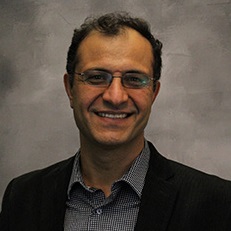 Dr. Mohammad H. Mahoor is a Professor of Electrical and Computer Engineering at DU. He does research in the area of computer vision and machine learning including visual object recognition, object tracking and pose estimation, motion estimation, 3D reconstruction, and human-robot interaction (HRI) such as humanoid social robots for interaction and intervention with children with special needs (e.g. autism) and elderly with depression and dementia. He has received over $6M of research funding from state and federal agencies including the National Science Foundation and National Institute of Health. He is a Senior Member of IEEE and has published more than 120 peer-reviewed scientific conference and journal papers. Dr. Mahoor received his Ph.D. in Electrical and Computer Engineering from the University of Miami, Florida in 2007.
Dr. Mohammad H. Mahoor is a Professor of Electrical and Computer Engineering at DU. He does research in the area of computer vision and machine learning including visual object recognition, object tracking and pose estimation, motion estimation, 3D reconstruction, and human-robot interaction (HRI) such as humanoid social robots for interaction and intervention with children with special needs (e.g. autism) and elderly with depression and dementia. He has received over $6M of research funding from state and federal agencies including the National Science Foundation and National Institute of Health. He is a Senior Member of IEEE and has published more than 120 peer-reviewed scientific conference and journal papers. Dr. Mahoor received his Ph.D. in Electrical and Computer Engineering from the University of Miami, Florida in 2007.
 Dr. Kris Hauser is an Associate Professor in the Department of Computer Science at the University of Illinois at Urbana-Champaign, and Affiliate of the Department of Electrical and Computer Engineering and the Department of Mechanical Science and Engineering. He received his PhD in Computer Science from Stanford University in 2008, bachelor's degrees in Computer Science and Mathematics from UC Berkeley in 2003, and worked as a postdoctoral fellow at UC Berkeley. He then joined the faculty at Indiana University from 2009-2014, where he started the Intelligent Motion Lab, and then joined the faculty of Duke University from 2014-2019. Prof. Hauser is a recipient of a Stanford Graduate Fellowship, Siebel Scholar Fellowship, Best Paper Award at IEEE International Conference on Humanoid Robots 2015, the NSF CAREER award, and three Amazon Research Awards. He also works as a consultant for Google's autonomous driving company, Waymo.
Dr. Kris Hauser is an Associate Professor in the Department of Computer Science at the University of Illinois at Urbana-Champaign, and Affiliate of the Department of Electrical and Computer Engineering and the Department of Mechanical Science and Engineering. He received his PhD in Computer Science from Stanford University in 2008, bachelor's degrees in Computer Science and Mathematics from UC Berkeley in 2003, and worked as a postdoctoral fellow at UC Berkeley. He then joined the faculty at Indiana University from 2009-2014, where he started the Intelligent Motion Lab, and then joined the faculty of Duke University from 2014-2019. Prof. Hauser is a recipient of a Stanford Graduate Fellowship, Siebel Scholar Fellowship, Best Paper Award at IEEE International Conference on Humanoid Robots 2015, the NSF CAREER award, and three Amazon Research Awards. He also works as a consultant for Google's autonomous driving company, Waymo.
His research interests include robot motion planning and control, semiautonomous robots, and integrating perception and planning, as well as applications to intelligent vehicles, robotic manipulation, robot-assisted medicine, and legged locomotion.
 Dr. Juan Wachs is the James A. and Sharon M. Tompkins Rising Star Associate Professor in the Industrial Engineering School at Purdue University. He is also an Adjunct Associate Professor of Surgery at Indiana University School of Medicine. He is the director of the Intelligent Systems and Assistive Technologies (ISAT) Lab at Purdue, and he is affiliated with the Regenstrief Center for Healthcare Engineering. He leads the Intelligent Systems and Assistive Technologies (ISAT) Laboratories at Purdue. He pioneered the field of gesture interaction in healthcare, for applications in the operating room and austere environments. He was awarded the 2012 Air Force Summer Faculty Fellowship Program (SFFP), awarded IEEE Appreciation Award for outstanding contribution to the success of Spring 2012 Section Conference. He is the recipient of the 2013 Air Force Young Investigator Award, co-authored the poster presentation award AAAI 2015. He was also awarded the 2015 Helmsley Senior Scientist Fellow, and he is the 2016 Fulbright Scholar and the 2017 Rising Star Professor. He is the technical advisor to "prehensile technologies" which looks at how to develop technologies to improve peoples with disabilities' wellbeing. He is a member of IEEE Systems, Man and Cybernetics Society, Affiliate, Regenstrief Center for Healthcare Engineering at Purdue University, Member of ORSIS Operations Research Society - Israel, Member of the IIE (Institute of Industrial Engineers). He served as guest editor of Pattern Recognition Letters, Special Issue on Robust Recognition Methods for Multimodal Interaction, 2013, Journal of Real-Time Image Processing, Special Issue on Pattern Recognition Methods for Real-Time Image Processing, and Guest Editor of Human-Computer Interaction journal, Special Issue on Body Sensing and Tracking in Healthcare, 2014. He is also the Associate Editor of IEEE Transactions in Human-Machine Systems, Frontiers in Robotics and AI, and the Journal of Real-Time Image Processing. His research interests include human-machine interaction, gesture recognition and assistive robotics.
Dr. Juan Wachs is the James A. and Sharon M. Tompkins Rising Star Associate Professor in the Industrial Engineering School at Purdue University. He is also an Adjunct Associate Professor of Surgery at Indiana University School of Medicine. He is the director of the Intelligent Systems and Assistive Technologies (ISAT) Lab at Purdue, and he is affiliated with the Regenstrief Center for Healthcare Engineering. He leads the Intelligent Systems and Assistive Technologies (ISAT) Laboratories at Purdue. He pioneered the field of gesture interaction in healthcare, for applications in the operating room and austere environments. He was awarded the 2012 Air Force Summer Faculty Fellowship Program (SFFP), awarded IEEE Appreciation Award for outstanding contribution to the success of Spring 2012 Section Conference. He is the recipient of the 2013 Air Force Young Investigator Award, co-authored the poster presentation award AAAI 2015. He was also awarded the 2015 Helmsley Senior Scientist Fellow, and he is the 2016 Fulbright Scholar and the 2017 Rising Star Professor. He is the technical advisor to "prehensile technologies" which looks at how to develop technologies to improve peoples with disabilities' wellbeing. He is a member of IEEE Systems, Man and Cybernetics Society, Affiliate, Regenstrief Center for Healthcare Engineering at Purdue University, Member of ORSIS Operations Research Society - Israel, Member of the IIE (Institute of Industrial Engineers). He served as guest editor of Pattern Recognition Letters, Special Issue on Robust Recognition Methods for Multimodal Interaction, 2013, Journal of Real-Time Image Processing, Special Issue on Pattern Recognition Methods for Real-Time Image Processing, and Guest Editor of Human-Computer Interaction journal, Special Issue on Body Sensing and Tracking in Healthcare, 2014. He is also the Associate Editor of IEEE Transactions in Human-Machine Systems, Frontiers in Robotics and AI, and the Journal of Real-Time Image Processing. His research interests include human-machine interaction, gesture recognition and assistive robotics.